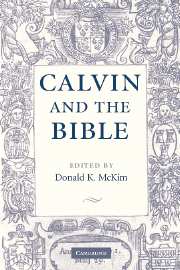Book contents
- Frontmatter
- Contents
- Notes on contributors
- Preface
- List of abbreviations
- 1 Calvin as commentator on Genesis
- 2 Calvin as commentator on the Mosaic Harmony and Joshua
- 3 Calvin as an interpreter of Job
- 4 Calvin as commentator on the Psalms
- 5 Calvin as commentator on the Prophets
- 6 Calvin as commentator on the Synoptic Gospels
- 7 Calvin as commentator on the Gospel of John
- 8 Calvin as commentator on the Acts of the Apostles
- 9 Calvin as commentator on the Pauline epistles
- 10 Calvin as commentator on Hebrews and the Catholic Epistles
- 11 John Calvin as an interpreter of the Bible
- Index
9 - Calvin as commentator on the Pauline epistles
Published online by Cambridge University Press: 09 November 2009
- Frontmatter
- Contents
- Notes on contributors
- Preface
- List of abbreviations
- 1 Calvin as commentator on Genesis
- 2 Calvin as commentator on the Mosaic Harmony and Joshua
- 3 Calvin as an interpreter of Job
- 4 Calvin as commentator on the Psalms
- 5 Calvin as commentator on the Prophets
- 6 Calvin as commentator on the Synoptic Gospels
- 7 Calvin as commentator on the Gospel of John
- 8 Calvin as commentator on the Acts of the Apostles
- 9 Calvin as commentator on the Pauline epistles
- 10 Calvin as commentator on Hebrews and the Catholic Epistles
- 11 John Calvin as an interpreter of the Bible
- Index
Summary
The Pauline commentaries are the most significant site, as a series, for grasping John Calvin's biblical work. Certainly, there are other claimants to that accolade – the wonderfully autobiographical preface to the Psalms commentary, the extraordinarily unique approach of the Harmony of the Pentateuch, the general brilliance which is so frequently evident. But the Pauline commentaries stand out, for several reasons. First, they are first! Of all the ways in which Calvin might have addressed himself to the task of commenting upon the Scripture, he chose to begin with the Pauline epistles, commenting upon them in canonical order. Calvin's health was never very good, and by the time he was deeply into the series he had experienced death in his own family. So, simply by virtue of being the first commentaries Calvin wrote, these were his choice for those books of the Bible that it was most necessary for him to comment upon, and, by extension, that it was most necessary to know.
Second, Calvin gave a theological rationale for making these his reference point. In his consideration of the theme of the epistle to the Romans, which was the subject of his very first commentary, he wrote:
I am in doubt whether it would be worth while to spend much time in speaking of the value of this Epistle. My uncertainty is due only to my fear that since my commendation of it falls far short of its grandeur my remarks may merely obscure the Epistle. It is due also to the fact that at the very beginning the Epistle introduces itself better and explains itself in a much better way than any words can describe.[…]
- Type
- Chapter
- Information
- Calvin and the Bible , pp. 224 - 256Publisher: Cambridge University PressPrint publication year: 2006
- 3
- Cited by

